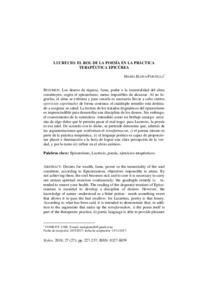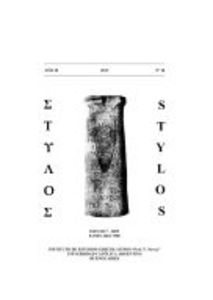Please use this identifier to cite or link to this item:
https://repositorio.uca.edu.ar/handle/123456789/9711| Título: | Lucrecio : el rol de la poesía en la práctica terapéutica epicúrea | Autor: | Pontelli, María Elena | Palabras clave: | Lucrecio, 99 a.C.-55 a.C.; TERAPEUTICA; LITERATURA GRIEGA; POESIA GRIEGA | Fecha de publicación: | 2018 | Editorial: | Universidad Católica Argentina. Facultad de Filosofía y Letras. Instituto de estudios grecolatinos "Prof. F. Nóvoa" | Cita: | Pontelli, M. E. Lucrecio : el rol de la poesía en la práctica terapéutica epicúrea. [en línea]. Stylos, 2018, 27. Dispinible en: https://repositorio.uca.edu.ar/handle/123456789/9711 | Resumen: | Resumen: Los deseos de riqueza, fama, poder o la inmortalidad del alma constituyen, según el epicureísmo, metas imposibles de alcanzar. Al no lo-grarlas, el alma se enferma y para curarla es necesario llevar a cabo ciertos ejercicios espirituales de forma continua: el cuádruple remedio está destina-do a asegurar su salud. La lectura de los tratados dogmáticos del epicureísmo es imprescindible para desarrollar una disciplina de los deseos. Sin embrago, el conocimiento de la naturaleza -entendido como un brebaje amargo- nece-sita de algo dulce que le permita pasar el mal trago: para Lucrecio, la poesía es esa miel. De acuerdo con lo dicho, se pretende demostrar que, además de las argumentaciones que conforman el tetrafarmacon, i) el poema mismo es parte de la práctica terapéutica, ii) el lenguaje poético es capaz de proporcio-nar placer e iluminación a la hora de lograr una clara percepción de la ver-dad, y por lo tanto iii) influir en el alivio anímico. Abstract: Desires for wealth, fame, power or the immortality of the soul constitute, according to Epicureanism, objectives impossible to attain. By not achieving them, the soul becomes sick and to cure it is necessary to carry out certain spiritual exercises continuously: the quadruple remedy is in-tended to ensure your health. The reading of the dogmatic treatises of Epicu-reanism is essential to develop a discipline of desires. However, the knowledge of nature -understood as a bitter potion - needs something sweet that allows it to pass the bad swallow: for Lucretius, poetry is that honey. According to what has been said, it is intended to demonstrate that, in addi-tion to the arguments that make up the tetrafarmakon, i) the poem itself is part of the therapeutic practice, ii) poetic language is able to provide pleasure and enlightenment when achieving a clear perception of the truth, and there-fore iii) influence on the psychic relief. |
URI: | https://repositorio.uca.edu.ar/handle/123456789/9711 | ISSN: | 0327-8859 | Disciplina: | LITERATURA | Derechos: | Acceso abierto | Fuente: | Stylos Nº 27, 2018 |
| Appears in Collections: | STY - 2018 nro. 27 |
Files in This Item:
| File | Description | Size | Format | |
|---|---|---|---|---|
| lucrecio-rol-poesia-practica.pdf | 185,64 kB | Adobe PDF |  View/Open | |
| stylos27.jpg | 297,44 kB | JPEG |  View/Open |
Page view(s)
68
checked on Apr 30, 2024
Download(s)
280
checked on Apr 30, 2024
Google ScholarTM
Check
This item is licensed under a Creative Commons License

